Restaurateurs

2014.036.016 Oral History Interview with Wing Ma November 7, 2003
Wing Ma (Ma Wing Guo) was born in China to a poor farming family who moved to Hong Kong as refugees when he was age two. Wing talks about his life growing up in Hong Kong with his mother working in the garment industry and his father working as a chef in Manila. He studied until post-secondary school before moving to the United States to train and work as an engineer. Wing would eventually join the garment industry as a factory owner, and describes the industry decline over time due to overseas competition. This would also lead to his own factory closure. He details workers pay, union benefits such as healthcare, and his involvement with union negotiations as a member and president of the Garment Manufacturers Association. Wing also talks about his involvement with other community organizations following his transition into the liquor industry, such as the Asian American Advisory Council under Peter Vallone and Community Board Three. He shares his experiences acting as a liaison between the government and the local community and shares some of the positive changes this brought to Chinatown. During the September 11th, 2001 attacks, he recalls being shocked and upset that he was unable to reach friends and loved ones. He talks about the effects of the attacks on Chinatown through his personal experiences as a building landlord. He recalls the mass exodus of tenants from the area and the difficulty in obtaining support from relief funds for the Chinatown community. He discusses the need for the government to subsidize and support businesses returning to the area to improve the local economy. He also encourages the Chinatown community to become more active and participate in local government or social work. He concludes with a discussion of his thoughts on the future of the garment industry and alternative job prospects for Chinatown residents.

2014.036.016 Oral History Interview with Wing Ma November 7, 2003
Wing Ma (Ma Wing Guo) was born in China to a poor farming family who moved to Hong Kong as refugees when he was age two. Wing talks about his life growing up in Hong Kong with his mother working in the garment industry and his father working as a chef in Manila. He studied until post-secondary school before moving to the United States to train and work as an engineer. Wing would eventually join the garment industry as a factory owner, and describes the industry decline over time due to overseas competition. This would also lead to his own factory closure. He details workers pay, union benefits such as healthcare, and his involvement with union negotiations as a member and president of the Garment Manufacturers Association. Wing also talks about his involvement with other community organizations following his transition into the liquor industry, such as the Asian American Advisory Council under Peter Vallone and Community Board Three. He shares his experiences acting as a liaison between the government and the local community and shares some of the positive changes this brought to Chinatown. During the September 11th, 2001 attacks, he recalls being shocked and upset that he was unable to reach friends and loved ones. He talks about the effects of the attacks on Chinatown through his personal experiences as a building landlord. He recalls the mass exodus of tenants from the area and the difficulty in obtaining support from relief funds for the Chinatown community. He discusses the need for the government to subsidize and support businesses returning to the area to improve the local economy. He also encourages the Chinatown community to become more active and participate in local government or social work. He concludes with a discussion of his thoughts on the future of the garment industry and alternative job prospects for Chinatown residents.
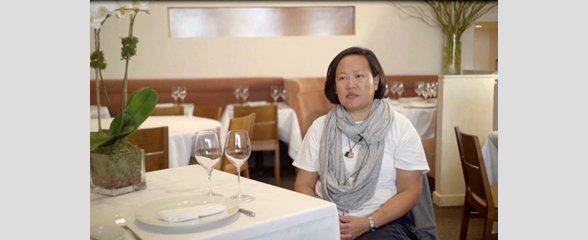
2016.037.015 Oral History Interview with Anita Lo 2015/10/23
Anita Lo is a first-generation Chinese American chef. Lo grew up in Birmingham, Michigan, and developed her interest in multicultural food at an early age. Leaving her white suburban hometown to attend boarding school in Massachusetts, Lo was introduced to a wide variety of cultures and people. She went on to study French at Columbia University, traveling abroad to attend Columbias French institute in Paris, where she quickly fell in love with French cuisine. After returning from abroad, graduating, and working at several New York City restaurants, Lo returned to France and attended the culinary school Ecole Ritz-Escoffier. Lo returned to New York and worked in several prominent eateries, including chef David Waltuck’s Chanterelle. Having developed her own unique contemporary American style and seeking creative control over her cooking, she opened her own restaurant Annisa in 2000. Lo describes her interest in adventurous, multicultural food and notes the importance of sustainably sourcing ingredients, especially seafood. She aspires for a more inclusive and equitable restaurant world. In the future, Lo hopes that minority chefs will be allowed to diversify their cooking beyond ethnic food and pave the way for less racialized kitchen spaces.
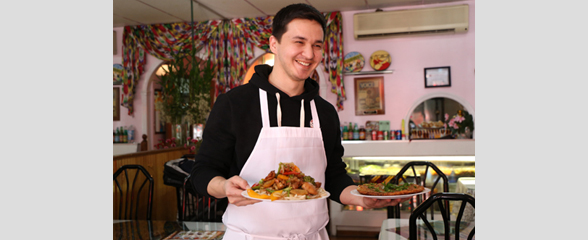
2016.037.017 Oral History Interview with Doniyar Sobitov, 2016/03/29
Doniyar Sobitov was raised in Tashkent, Uzbekistan and moved to New York City in 2007 with his father and brother. His family opened their Halal Uzbek restaurant called Café Kashkar together in Brooklyn. Café Kashkars food is based on cuisine from the Kashgar region, a city in the western side of Chinas Xinjiang province. During this oral history interview, Sobitov describes his childhood in Tashkent, learning to cook with his father, and his aspiration to attend culinary school in China eventually. He goes on to explain that food is not only an important aspect of Uzbekistan culture, but also a means for life and survival for his family. Sobitov lives in the United States with his father, brother, and sister, but his mother, wife, and two year old child still live in Tashkent, a division that is difficult for his family. Describing the multilingual neighborhood in which Café Kashkar is located, Sobitov explains that he speaks four languages in addition to english to communicate with his diverse customer base: Turkish, Uzbek, Russian, and Uyghur. He emphasizes the similarities between Uyghur and Chinese food, describing them as “basically the same thing†and adds that Cafe Kashkar imports some of its key ingredients from Xinjiang.
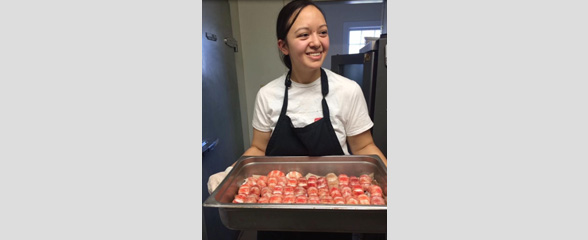
2016.037.018 Oral History Interview with Cara Stadler 2015/10/01
Cara Stadler is a third-generation Chinese American chef. She was raised in Massachusetts and grew up biracial in a predominantly white community. Stadlers love of food began during her childhood, when her mother would make a wide variety of Shanghainese dishes. While Stadlers culinary education began in her mothers kitchen, her career experience started in American restaurant kitchens. She worked under Marsha McBride at Cafe Rouge in Berkley and then Striped Bass in Philadelphia. As her passion for food grew and she realized she wanted to pursue a professional career in the culinary arts, she moved to France to hone her fine dining skills. Stadler studied the artistry and technical precision of French cooking while working at Guy Savoy and Gordon Ramsays Au Trianon Palace. Afterwards, she worked in different parts of East Asia including China and Singapore. During this period she launched the prive fine dining service Gourmet Underground in Beijing. Stadler returned to the U.S. in 2011 and collaborated with her mother to open her first restaurant Tao Yuan in Maine. They also later opened Bao Bao Dumpling House together. Stadler credits food for reconnecting her to her Chinese heritage. She expresses excitement at the growth of ethnic foods in the United States, noting that the American public is increasingly open to foreign foods and flavors. Stadler also underscores the importance of sustainability and ethical ingredient sourcing in the food world, and she adds that she hopes to contribute to positive changes in the industry.
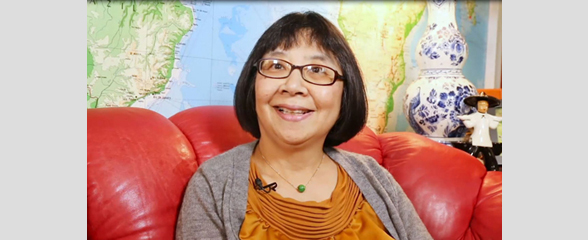
2016.037.020 Oral History Interview with Yvonne and Mike Thompson 2015/12/02
Yvonne and Mike Thompson are restaurant owners who started their small business in Pounding Mill, Virginia in 1979. Their restaurant, Cuzs, brought an unexpected combination of Southern homestyle cooking with Chinese cuisine to their small coal mining town. Yvonne was born and raised in Hong Kong and describes enjoying delicious home cooked meals as well as dim sum restaurants and banquets during her childhood. She later moved to St Louis, Missouri to attend college and work in her Uncle Wongs upscale Chinese restaurant The Lantern House. Eventually opening a barbeque restaurant on her husband Mikes family dairy farm, Yvonne explains how she gradually shaped their menu to include American Southern-Chinese fusion dishes like their popular cheese eggroll. Yvonne is proud of the cultural impact Cuzs has had on their small coal-mining community. Mike Thompson was born and grew up in Cedar Bluff, Virginia. While several of his family members became doctors and pursued the medical field, the family also owned and operated a large 5,000 acre farm. Mike fondly describes his childhood experiences of enjoying his mothers homestyle Southern cooking and hospitality. He goes on to describe how he opened Cuzs restaurant with his wife Yvonne on his familys farm. Mike notes that international travel has played a significant role in expanding his palette and improving his cooking.
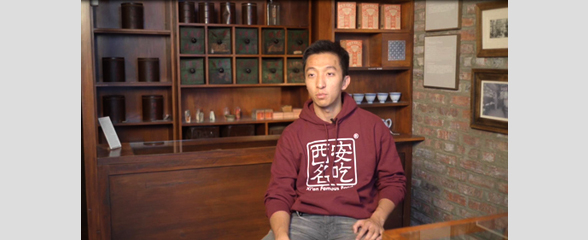
2016.037.024 Oral History Interview with Jason Wang 2015/10/23
Jason Wang was born in XiAn, China and moved to the U.S. when he was eight years old. Wang and his family lived in various suburban communities during his childhood while his father worked at different Chinese restaurants. Wang’s father eventually opened a bubble tea franchise that later evolved into their successful XiAn Famous Foods restaurant. After spending college breaks helping his father at the bubble tea shop and feeling ungratified by his post-graduation corporate job, Wang decided to begin his career as a restauranteur with his father. Wang helped his father update XiAn Famous Foods by translating its menu into English and creating a website for the business. The original Flushing, Queens location developed a solid fanbase and saw even greater success after Anthony Bourdain mentioned the eatery on his hit television show No Reservations in 2008. Since then, XiAn Famous Foods has expanded to over ten locations across New York City five boroughs. Wang is proud to have pioneered the previously unknown street cuisine of his hometown in America. He hopes that their “fast-casual†restaurant model will enable them to expand to other regions in the U.S. and introduce an increasingly adventurous American public to Xian classics like their iconic liang pi “cold-skin noodles.â€